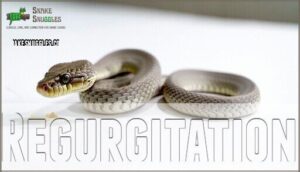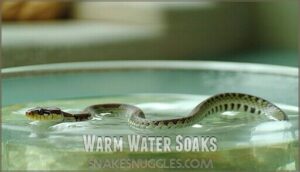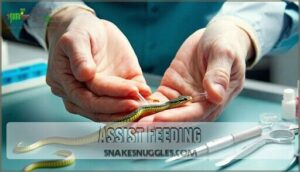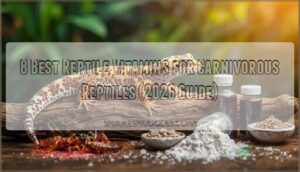This site is supported by our readers. We may earn a commission, at no cost to you, if you purchase through links.

Start with warm water soaks for 15-30 minutes daily to help soften blockages. Increase humidity in their enclosure to 70-80% and make certain proper hydration.
You can try gentle abdominal massage, but don’t force it. A small amount of vegetable oil mixed with food might provide lubrication.
However, these impacted snake home remedy approaches work best for minor cases. Severe impactions require immediate veterinary attention, especially if your snake shows signs of distress or refuses food for extended periods.
The right combination of these techniques can make all the difference in your pet’s recovery.
Table Of Contents
- Key Takeaways
- Snake Impaction Causes
- Identifying Impacted Snakes
- Home Remedies for Impaction
- Natural Remedies for Snakes
- Preventing Future Impactions
- Frequently Asked Questions (FAQs)
- How to help a constipated snake with home remedies?
- What will flush out a snake?
- How to help impaction in reptiles?
- How to tell if a snake has impaction?
- How long does snake impaction recovery take?
- Can baby snakes get impacted too?
- What temperature helps with snake impaction?
- Should I massage my impacted snake?
- When is veterinary intervention absolutely necessary?
- Conclusion
Key Takeaways
- Start with gentle home remedies first – Try warm water soaks for 15-30 minutes daily, increase humidity to 70-80%, and provide gentle abdominal massage to help soften and move blockages naturally.
- Prevention beats treatment every time – Use safe substrates like paper towels or cypress mulch, feed appropriately sized prey (10-15% of body weight), and maintain proper hydration to avoid impaction altogether.
- Know when to call the vet – If your snake shows severe symptoms like complete food refusal, visible distress, or no improvement after a few days of home treatment, you need professional help immediately.
- Address the root causes – Most impactions stem from substrate ingestion, oversized prey, or dehydration, so fix these environmental and feeding issues to prevent future problems.
Snake Impaction Causes
Understanding what causes impaction in your snake is essential for prevention and early treatment.
Three main factors contribute to this serious condition: ingesting substrate materials, feeding inappropriate foods, and insufficient hydration levels.
Ingestion of Substrate
When your snake accidentally ingests substrate materials, you’re looking at a common cause of impaction.
Substrate ingestion is a leading cause of dangerous blockages in pet snakes.
Different substrate types pose varying risks – fine particles like sand or wood chips create more danger than larger pieces.
Snake age matters too, since younger reptiles are more susceptible to blockages.
Poor feeding methods and cramped enclosure design increase ingestion chances, making proper snake impaction symptoms recognition essential for effective impacted snake treatment.
Improper Diet
Poor feeding choices can trap your snake in digestive distress.
Prey that’s too large, feeding too frequently, or lacking proper nutrition creates blockages that require immediate attention through proven snake home remedies.
Common feeding mistakes include:
- Prey Size – Offering food wider than your snake’s thickest body part
- Feeding Frequency – Overfeeding young snakes or adults too often
- Food Variety – Relying solely on one prey type without nutritional supplementation
Dehydration
When you don’t provide enough water, your snake’s digestive system slows down substantially.
Water quality matters because contaminated sources can worsen problems. Low humidity levels affect shedding issues, creating blockages that impact organ function.
Poor hydration changes snake behavior, making them lethargic and constipated. Recognizing sunken eyes and lethargy can be an early indicator of dehydration.
For snake impaction cure and reptile impaction relief, maintaining proper snake care tips includes consistent water access and humidity monitoring for effective snake constipation relief.
Symptoms of Impaction
When dehydration weakens your snake’s digestive system, recognizing snake impaction symptoms becomes essential for quick intervention.
Watch for lack of appetite, lethargy, and regurgitation – classic signs your pet’s struggling. You’ll notice unusual posture, breathing difficulty, and straining defecation attempts.
Scale changes and a palpable mass in the abdomen confirm impaction.
Early detection guarantees effective snake constipation relief and prevents serious complications requiring emergency snake impaction cure treatments.
Identifying Impacted Snakes
You’ll notice several warning signs when your snake is impacted that require immediate attention. These symptoms include refusing food, showing unusual lethargy, regurgitating meals, and developing visible abdominal swelling.
Lack of Appetite
One telltale sign you’ll notice is your snake’s complete disinterest in food.
When your snake turns away from food completely, impaction may be the culprit.
When dealing with snake impaction symptoms, appetite triggers become nonexistent as the digestive blockage prevents normal feeding schedules.
Environmental stressors and nutritional deficiencies often worsen this condition.
Treating snake blockage requires addressing underlying illnesses that affect snake digestive health, making reptile constipation treatment essential for resolving snake feeding problems.
Lethargy
Your snake’s energy levels drop dramatically when digestive blockages occur.
Lethargy manifests as reduced movement, reluctance to explore, and extended periods of inactivity.
This symptom often indicates lethargy severity requiring immediate attention.
Proper lethargy diagnosis involves observing behavioral changes alongside other signs.
Natural snake laxative options and reptile digestive aids can address underlying lethargy causes, while lethargy treatment focuses on resolving snake feeding problems through gentle intervention methods.
Regurgitation
When your snake becomes sluggish, regurgitation often follows as another warning sign.
This happens when reptile digestive aid isn’t working properly, creating digestion problems that force food back up. Stress factors and nutritional deficiencies worsen this condition.
After regurgitation occurs, handling post-regurgitation care becomes critical. Watch for reptile health issues and seek reptile vet advice immediately for proper reptile digestive support.
Abdominal Swelling
Looking at your snake for abdominal swelling requires careful observation and gentle techniques.
Swelling location matters – mid-body distension often indicates impaction, while lower abdominal swelling suggests other reptile constipation signs.
Key Assessment Steps:
- Palpation Techniques – Gently feel along the snake’s belly for hard masses or unusual firmness
- Severity Assessment – Compare both sides of the abdomen for asymmetrical bulging
- Underlying Causes – Consider recent feeding, substrate ingestion, or dehydration as factors
- Diagnostic Imaging – Severe cases may require veterinary X-rays for treating impacted reptiles
Monitor snake illness signs closely, as abdominal swelling combined with other symptoms warrants immediate reptile digestive support.
Home Remedies for Impaction
When your snake shows signs of impaction, you can try several home remedies before seeking veterinary care.
These methods focus on creating conditions that help your pet naturally pass the blockage through gentle, non-invasive techniques.
Increasing Humidity
Higher humidity levels can speed up your snake’s recovery from impaction. Moisture helps soften blockages and supports natural digestive processes.
You’ll want to raise your enclosure’s humidity to 70-80% temporarily while monitoring your pet’s response. A dedicated humidity solution can help maintain these levels.
| Humidity Method | Target Level |
|---|---|
| Misting enclosure | 70-75% |
| Humid hide box | 80-85% |
| Substrate dampening | 65-70% |
Watch for reptile health issues like respiratory problems if humidity stays too high. Most snake illness signs improve with proper moisture levels, making this a gentle first step before considering reptile vet advice for treating impacted reptiles.
Warm Water Soaks
Gentle warm water soaks can ease your impacted snake’s discomfort and help loosen blocked feces.
Fill a shallow container with lukewarm water—around 85-90°F works best.
Soak Duration should be 10-15 minutes, with Soak Frequency of once daily until improvement shows.
Always supervise for Snake Safety and watch for signs of stress, as this home remedy supports reptile health issues naturally and can be an effective way to address reptile health concerns.
Assist Feeding
When soaks aren’t enough, assist feeding can help your impacted snake regain strength. This snake health guide technique works when your pet’s affected digestive system needs gentle encouragement.
- Warm frozen thawed prey to body temperature before offering
- Choose proper prey size – no larger than your snake’s thickest body part
- Use scenting prey with chicken broth to increase appeal
- Maintain normal feeding frequency but monitor closely for regurgitation
This home remedy bridges the gap between natural recovery and veterinary intervention when substrate remains lodged. If other methods fail, consider assist or force feeding as a last resort to help your snake recover from an impacted digestive system and regain its strength through assist feeding and proper care.
Dietary Changes
When your snake faces impaction, strategic dietary changes can jumpstart recovery.
Reduce prey size by 25% and increase food variety with softer options. Adjust feeding frequency to every 10-14 days instead of weekly.
Consider gut loading prey with easily digestible nutrients. Supplementation with probiotics supports digestive health.
Follow your snake health guide for this medical condition’s pathology requirements.
Natural Remedies for Snakes
When your snake faces impaction, natural remedies can provide gentle relief alongside proper veterinary care. These time-tested solutions work by supporting your pet’s digestive system and promoting natural elimination processes.
Pumpkin as a Fiber Source
Plain canned pumpkin offers excellent Fiber Benefits for impacted snakes through its dual-action approach.
Pumpkin Nutrition includes both soluble and insoluble fiber that softens solid matter while adding bulk to surrounding matter.
Safe Dosage involves 1-2 teaspoons for smaller snakes, adjusted by size.
Pumpkin Preparation requires avoiding pie filling with added sugars.
This natural remedy supports healthy distribution of waste through gentle lifestyle adjustments. It’s effective due to the high moisture content in pumpkin, as seen in the link to high moisture content, which is a key factor in its dual-action approach and overall Pumpkin Nutrition.
Vegetable Oil for Lubrication
Vegetable oil works by coating impacted solid matter and surrounding matter in your snake’s digestive system. This creates a slippery layer that helps lodged material move through more easily.
However, mineral oil remains the safer choice for most situations. Some owners purchase specific oil products for their snakes.
Safe Application Guidelines:
- Oil Dosage: Use 2-3 drops for small snakes, adjusting for body weight
- Oil Types: Olive oil works best among vegetable oils, but mineral oil is preferred
- Lubrication Benefits: Helps embedded waste pass through intestinal walls
- Treatment Risks: Watch for aspiration during administration – seek vet care if no improvement in 48 hours
Honey for Hydration
Occasionally, diluted honey can help rehydrate an impacted snake when used sparingly.
Mix one part honey with three parts water for safe dilution.
This remedy works best for mild cases, but dosage matters vitally for your pet’s safety.
Consider snake honey’s hydration benefits for your pet.
| Honey Types | Dilution Ratio |
|---|---|
| Raw honey | 1:3 with water |
| Manuka honey | 1:4 with water |
| Clover honey | 1:3 with water |
| Wildflower honey | 1:3 with water |
| Honey Benefits | Contraindications |
| —————- | ——————- |
| Natural hydration | Diabetes risk |
| Easy absorption | Overfeeding danger |
Probiotics for Gut Health
Building on hydration support, your snake’s gut microbiome needs attention too.
Probiotics containing specific strains like Lactobacillus help restore beneficial bacteria that support digestion when your impacted snake recovers.
Community health departments often recommend these supplements for therapy, and your snake’s public health depends on balanced gut flora.
Follow dosage guidelines carefully – quality matters for long-term effects.
Preventing Future Impactions
Once you’ve helped your snake recover from impaction, you’ll want to take steps to prevent it from happening again.
The good news is that most impactions are completely preventable with proper care and attention to your snake’s environment and diet.
Proper Substrate Selection
Choose safe substrates like paper towels, newspaper, or cypress mulch to prevent impaction.
Avoid sand, gravel, or small particles your snake might ingest.
Safe substrates offer humidity retention without digestion concerns, provide cleaning ease, and guarantee cost effectiveness.
Your substrate choice directly impacts your pet’s health and reduces environmental impact on communities through proper waste management.
Balanced Diet Planning
Your snake’s diet directly impacts its digestive health, creating a cause and effect relationship between feeding choices and impaction risk. Smart feeding prevents problems before they start.
Follow these guidelines for ideal nutrition:
- Prey Variety – Rotate between mice, rats, and chicks to provide balanced nutrients
- Size Matters – Feed prey 10-15% of your snake’s body weight maximum
- Nutrient Ratios – Maintain proper calcium-phosphorus balance through varied prey
Establish a consistent Feeding Schedule based on your snake’s age and species. Young snakes need weekly meals, while adults eat every 10-14 days.
Monitor your pet’s behavioral impact after meals – healthy snakes should digest within 48-72 hours. Avoid Supplementation unless veterinary-recommended, as whole prey provides complete nutrition.
Hydration Management
Fresh water remains your best defense against future impactions.
Keep water bowl size appropriate for your snake’s length, allowing full body soaking.
Misting frequency should maintain humidity levels between 50-60% for most species.
Monitor substrate moisture carefully, as overly wet conditions can affect your snake’s health.
Consider hydration supplements if your pet shows behavioral changes indicating dehydration.
Maintaining the right environment with full body soaking opportunities is crucial for your snake’s overall health.
Regular Veterinary Check-ups
Schedule annual checkups with an exotic veterinarian experienced in reptile care.
Early Detection helps catch problems before they become serious. Your vet provides Expert Advice on proper husbandry and diet.
Regular Health Monitoring through professional exams confirms your snake’s digestive system functions properly. A snake health checklist can help you monitor your snake between visits.
Preventative Care beats emergency Treatment Options when dealing with impacted snakes requiring immediate medical intervention.
Frequently Asked Questions (FAQs)
How to help a constipated snake with home remedies?
Warm up your pet’s enclosure to the higher end of its safe range, offer a lukewarm shallow soak, and gently massage its lower belly.
If there’s no improvement soon, call your reptile vet for help.
What will flush out a snake?
Looking to clear a snake’s digestive blockage? You’ll want to provide warm soaks, gentle belly massages, and increased humidity.
Offering smaller prey items can help too.
However, severe impaction requires immediate veterinary attention for safe treatment.
How to help impaction in reptiles?
Increase your reptile’s temperature to 85-95°F, provide warm soaks for 15-20 minutes daily, and gently massage their belly.
Offer smaller, softer foods and make certain of proper hydration.
Consult a reptile veterinarian if symptoms persist.
How to tell if a snake has impaction?
Your snake’s acting sluggish and hasn’t pooped in weeks?
Look for swollen belly, loss of appetite, lethargy, and difficulty passing waste.
You’ll notice visible bulges or hardness in their abdomen when gently palpating.
How long does snake impaction recovery take?
Recovery time varies widely depending on severity and treatment method.
Mild cases may resolve within days with proper care, while severe impaction can take weeks or months to fully heal after veterinary intervention.
Can baby snakes get impacted too?
Like tiny puzzle pieces that don’t quite fit, baby snakes can absolutely get impacted too.
Their smaller digestive systems make them even more vulnerable to blockages from substrate, prey that’s too large, or dehydration than adult snakes, which can lead to severe health issues due to dehydration.
What temperature helps with snake impaction?
Warmer temperatures around 85-88°F help your snake’s digestive system work better.
You can increase their basking spot temperature slightly or provide a warm soak to encourage natural bowel movements and relief.
Should I massage my impacted snake?
Absolutely never massage an impacted snake – you’ll worsen the blockage and potentially cause internal injuries. Instead, provide warm soaks and consult a reptile veterinarian immediately for proper treatment.
When is veterinary intervention absolutely necessary?
Get veterinary care immediately if your snake shows signs of distress, hasn’t defecated in weeks, appears lethargic, refuses food completely, or shows visible swelling.
Conclusion
Like a skilled physician with a gentle touch, these impacted snake home remedy techniques can breathe new life into your struggling pet.
You’ve learned seven safe methods to address impaction, from warm water soaks to dietary adjustments.
Remember, these remedies work best for minor cases, if your snake shows severe symptoms or doesn’t improve within a few days, don’t hesitate to contact your veterinarian.
Prevention remains your best tool for keeping your scaly companion healthy and happy and it is crucial to act quickly when you notice any signs of impaction to ensure the well-being of your pet, with prevention being key.
- https://docs.google.com/forms/d/1GAQr3Kn1cURCVHUA82hAga1Wv8DCH0IuqDLRUrOpN7M/viewform?ts=63f4f653&entry.1515682415=https://www.merriam-webster.com/thesaurus%2Fimpacted
- https://premium.britannica.com/mw-unabridged/?utm_source=mw&utm_medium=inline-def&utm_campaign=evergreen
- https://www.ixl.com/feedback/vocabularydotcom
- https://it.thefreedictionary.com/dente
- https://www.reptileforums.co.uk/threads/how-to-assist-force-feed-my-method.735960/
















